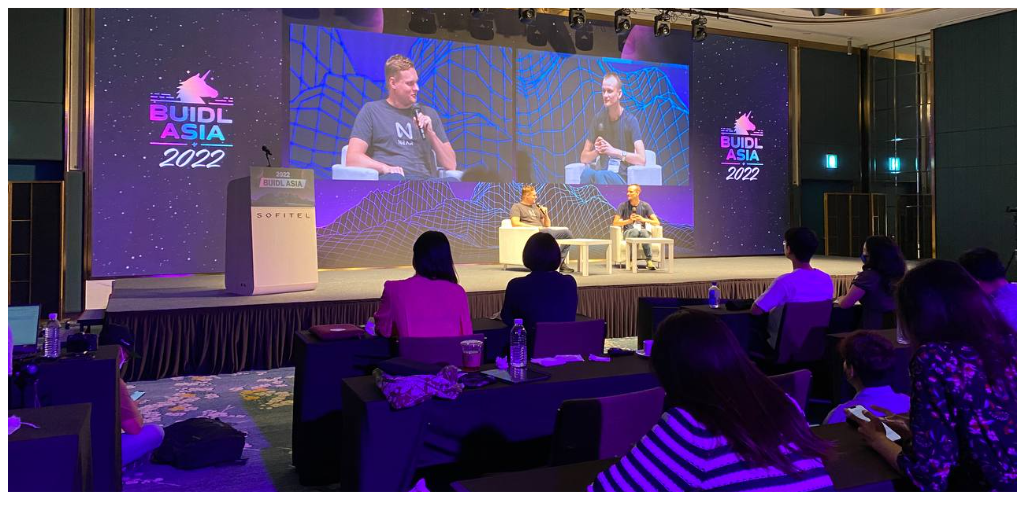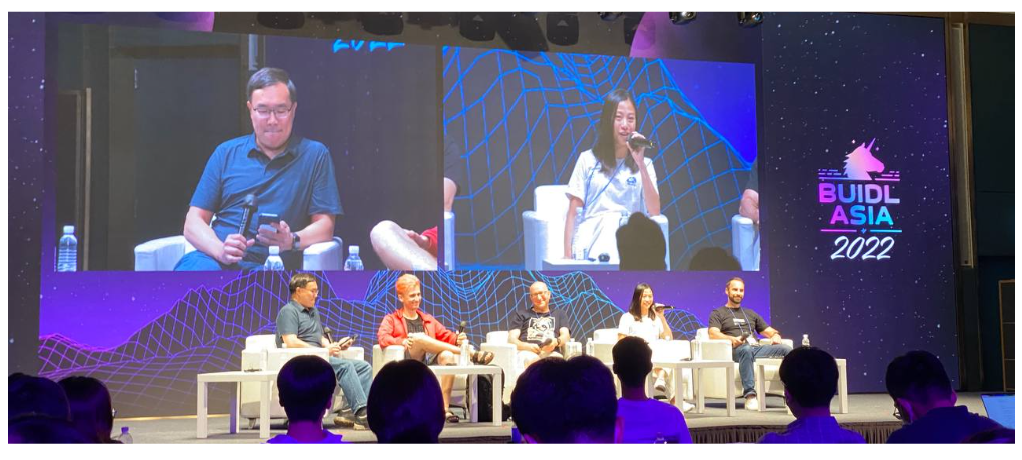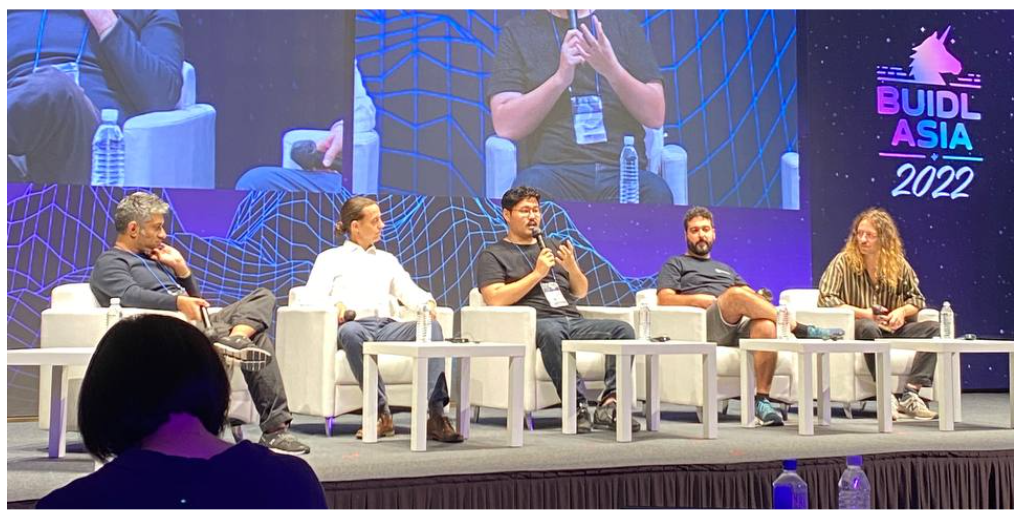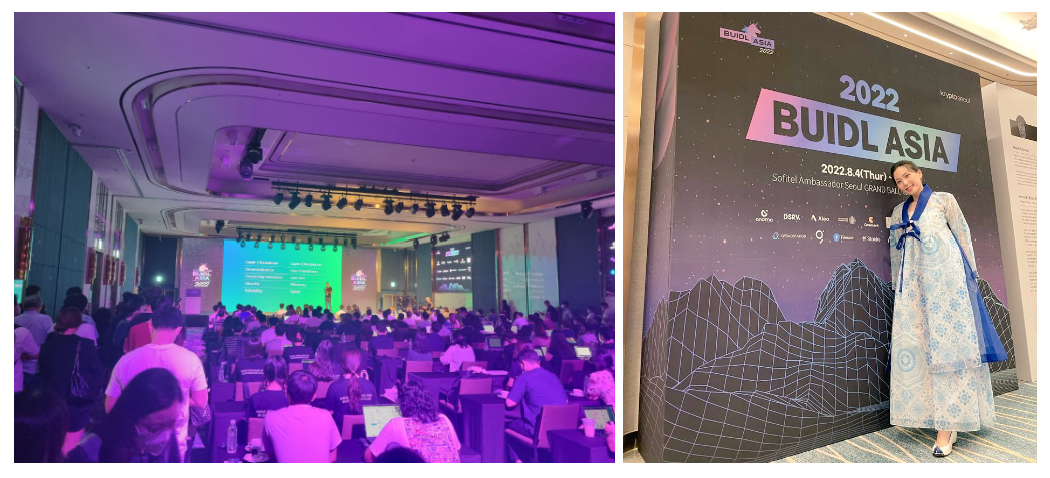Hosted and organized by KryptoSeoul, BUIDL Asia 2022 took place on August 4-5, bringing the ultimate opportunity to interact among developers, communities, and businesses across the globe.
August 4, 2022
Yap Global
Time flies when there are multiple talks from the brightest minds in the blockchain and crypto space, while meeting like-minded people and gathering almost too much swag.
Much like the adorable Unicorn, BUIDL Asia is full of pleasant delights and surprises, connecting projects and builders from across the globe and chains 🌈
“As the bear market fuels a season of building and innovation, we hope to provide developers, businesses and community members with a conducive space to gather and connect with the top minds in the current scene,” said Erica Kang, CEO and Founder of KryptoSeoul. “With BUIDL Asia Week (Seoul, 2022), we conceptualised the events with developers in mind, aiming to bring opportunities into Asia’s market as acceptance of the technology increases.”
🌟 It was a jam-packed day with all the big hitters such as Vitalik Buterin, Founder of Ethereum, Illia Polosukhin, Co-Founder of Near Protocol and Eli Ben-Sasson, Co-Founder and President of StarkWare just to name a few.
Aside from touching on danksharding, verkle trees, and the impending Goerli testnet, Vitalik Buterin explained how improving compression can help improve efficiency for rollups. He also covered zk-EVM implementations, and others such as zk-sync and Starkware, while also sharing on the large efficiency improvements and adoption of Optimism and Arbitrum.
Along with the impending merge, Vitalik reiterated the approach and principles behind scaling the Ethereum ecosystem:
“The Ethereum protocol is undergoing a long and complicated transition to becoming a much more robust and powerful system”.
While Ethereum will be undergoing many upgrades, the emphasis will always be creating a decentralised and secure system — The Merge will eventually introduce 2 new phases of growth for Ethereum through The Surge and The Verge.
“We want it to be possible for users to transact through the blockchain while keeping things affordable… But if these are things we try to achieve through layer 1s there might be security risks”, said Buterin.
Illia Polosukhin touched on the open source and integrated nature of the NEAR ecosystem and its ability to run with various ecosystems with Flux, Octopus, calimero, Aurora, Pagoda and OnMachina, with one of its key focuses being UI and UX.
“Usability matters, as Web3 needs to be easier for developers and users to achieve mainstream adoption, and most protocol roadmaps do not mention usability,” said Polosukhin.
 Some interesting tidbits from the fireside chat that followed with Vitalik and Illia were on Soulbound tokens and building with scalability.
Some interesting tidbits from the fireside chat that followed with Vitalik and Illia were on Soulbound tokens and building with scalability.
According to Vitalik, “The problem that Soulbound tokens are trying to solve is that governance is built on tokens which can be transferred, and therefore every token doesn’t tell much about yourself. One interesting use case would be governance, where you might want to airdrop tokens to users who have participated more in one particular event or has more of a certain skill.”
Illia responded:
“How do we build something that everyone can use? Right now we are in this stage of cambrian explosion — everybody has a lot of ideas and some projects will fail but there will be some stabilisation”
Scalability was the focus of most discussions during the conference, with Eli Ben-Sasson of Starkware sharing on being a developer-first brand to ensure efficient and effective scalability.
“We hope to achieve ten times the throughput of Ethereum by the end of 2022 [where] There will be a developers first vision where developers will be rewarded first, with the aim to scale StarkNet with moonmath calculations on Ethereum,” said Ben-Sasson.
Adding on to this, Adrian Brink, Founder of Anoma, asserted the need for “solvers to find compatible intents and create transactions, where intents are composable and transactions are settled on a settlement layer, and are fully programmatic within gas costs.”It goes beyond looking at rollups and programmable settlements, rather, it is through “Homogeneous architecture, heterogeneous security is where protocols can be benevolent monopolies.”
BUIDL Asia 2022 also focused heavily on the evolution of zero-knowledge technology, with Alex Pruden, COO of Aleo stating:
“The Fundamental breakthrough of ZK tech is that it allows you to prove you have a royal flush without actually showing it.” Addressing the challenges of ZKProof, he elaborated on how “The incompatibility with existing EVMs can be tackled through clear improvements, how Aleo’s tools facilitate this growth in the ecosystem, and how data availability is pivotal for powerful proof systems.”

The panel for ZKPs for scaling and privacy was moderated by Teck Chia (Head & GP of Gnosis Buidlers & Factor), with Adrian Brink, (Founder of Anoma), Alex Pruden, (COO of Aleo), Eli Ben-Sasson, (Co-Founder and President of Starkware), and Jane Ma (Co-Founder of zkLend) having a meaningful discussion on balancing between privacy, scalability, security and tooling.
There was a strong emphasis on security through privacy, as institutions have increasingly shown violations of that. On a positive note, they also elaborated on the applications to real-world use cases such as voting where there is a lot of potential to be able to improve lives.

On “The Interoperability Round Table” panel moderated by Zaki Manian (Co-founder, Sommelier), Mustafa Al-Bassam (CEO, Celestia Labs), Ethan Frey (Co-founder & Father, Confio & CosmWasm), Noam Cohen (Developer Relations Lead, Interchain GmbH), and Josh Lee (Co-founder, Keplr Wallet & Osmosis) discussed the different approaches to scaling and interoperability with its security concerns.
Noam focused more on building functionality in the Cosmos Hub first, before scaling, whereas Mustafa embraced the ability to easily launch your own project on your own chain. Josh also spoke about the risks of hacks and interchain MEV, while Ethan also emphasized not to neglect thinking about what can be done if the ecosystem can be trusted and is secure.

